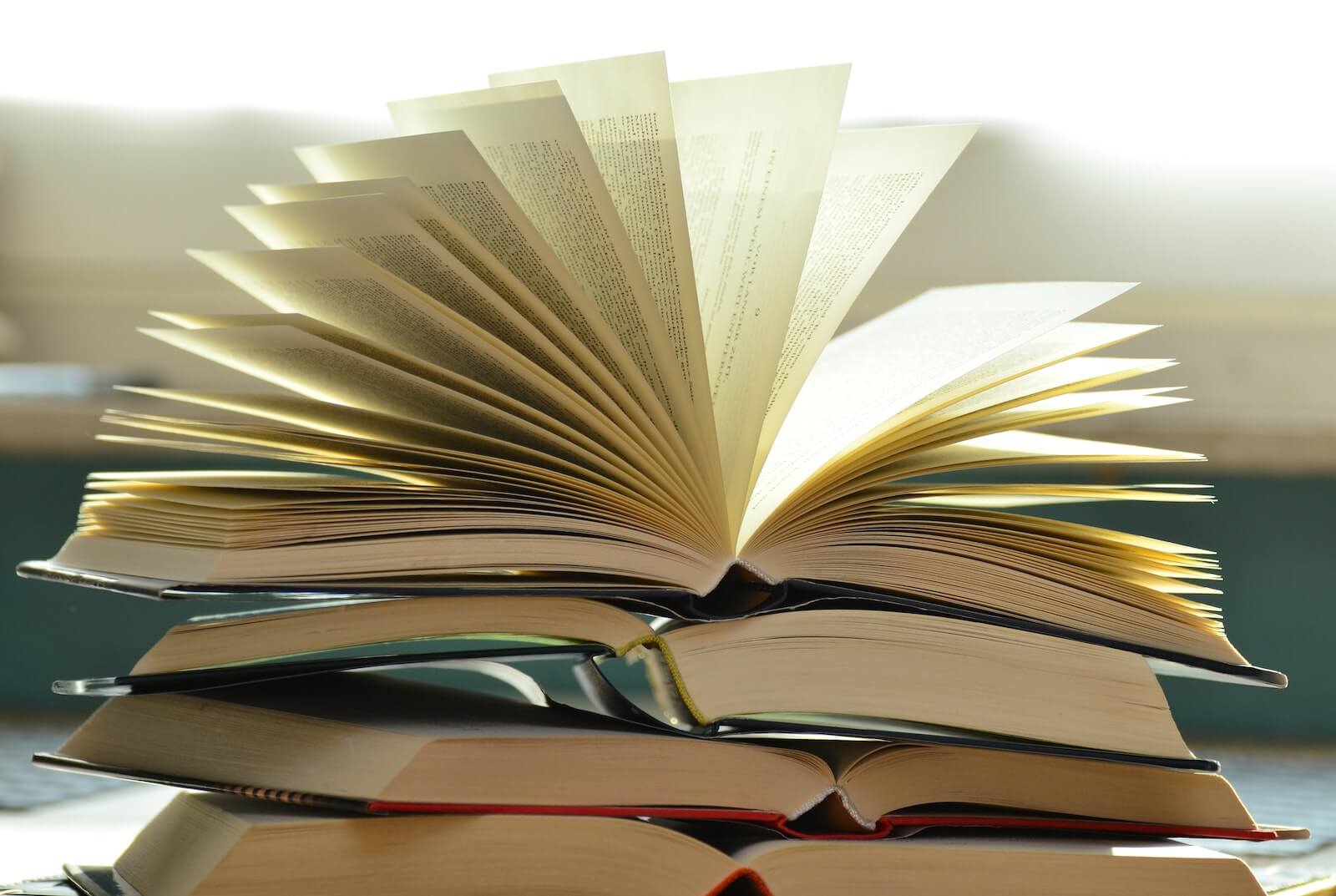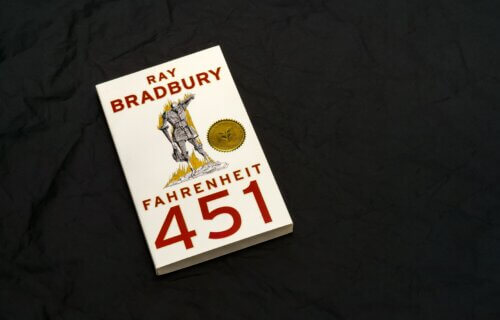Utopia is the state of a civilization’s peace and prosperity that seems impossible to realize in real life, and it is the backdrop for many great works of science fiction like the “Star Trek” media franchise. On the far opposite end of this scale is a dystopia, where an elite few crush the masses beneath them in settings plagued by famine, pollution, and violent conflict. Dystopian novels serve as a cautionary tale of what could happen if corruption and greed are allowed to grow unchecked. Our list of the top five best dystopian novels is a collection of some of the most thought-provoking science fiction ever written.
Dystopian novels are typically considered a subgenre of science fiction. Where science fiction considers the impact of technology for both good and ill, dystopian narratives usually focus on the aftermath of societal collapse. One common theme in dystopian fiction is that something, some critical part of civilization, has utterly failed. In many works like “The Hunger Games” (2008) or “The Handmaid’s Tale” (1985), it is the American political system itself that breaks down, leading to a dark future of suffering and inequality.
It is in these darkly imaginative settings that readers become familiar with a main character that is almost always a relatable person. Characters like “Fahrenheit 451” protagonist Guy Montag are a stand-in for the reader to let them experience the harrowing events of the story firsthand. When dystopian books stray far from reality in their premise and setting, it is these grounded main characters that drive the plot and keep the story relatable. Even in books like William Gibson’s 1984 cyberpunk classic, “Neuromancer” where reality is taken to a dark techno-hellscape, it is the main character Case that keeps the reader engaged.
The greatest dystopian novels focus on human suffering and loss of individual freedom. Corporate, bureaucratic, and technological entities are the common enemy of the individual as seen in George Orwell’s “1984” (1949) wherein a person’s thoughts are policed. Or as in “Brave New World” (1932) by Aldous Huxley where society is controlled and manipulated by a morals-driven totalitarian government that punishes nonconformity. These thought-provoking novels are meant to serve as cautionary stories that emphasize the importance of social engagement to prevent these visions of dark dystopias from becoming reality.
For readers that are curious about this popular subgenre, our list of the top five best dystopian novels could be a great resource to find a new read. Let us know your favorite books in the comments below! Happy reading!

The List: Best Dystopian Novels, According to Readers
1. “We” by Yevgeny Zamyatin (1924)
“We” is about the loss of humanity at the hands of crushing technology. It explores the best themes of science fiction dystopia but is focused on the human experience in this nightmarish future world. Penguin raves, “The novel that gave birth to ‘Nineteen Eighty-Four’ and ‘Brave New World?’ Perhaps. There’s no denying the influence of this early dystopia in which, a thousand years after the world has been conquered, humanity lives in totalitarian ‘harmony’. That is until D-503, a mathematician who dreams in numbers, makes a discovery: he has an individual soul.”

Oprah Daily praises, “‘We,’ a novel written in the early years of the Soviet Union and published in New York in 1923, is said to be the inspiration for George Orwell’s seminal ‘1984’ and Aldous Huxley’s ‘Brave New World.’ The book is set 1,000 years into a ‘utopia,’ which demands its citizens give up every ounce of individuality.”
“Yevgeny Zamyatin’s ‘We’ is the worthy precursor to much of the dystopian fiction readers have enjoyed for the last 100 years. The novel follows D-503, a mathematician in a totalitarian 26th-century society, who discovers something that will change the world: He has a soul. The numerous translations from its native Russian have kept its poetic prose and brilliant themes of individual freedom for a wide audience to enjoy and ponder,” exclaims Entertainment Weekly.
2. “Fahrenheit 451” by Ray Bradbury (1953)
In this American classic, Guy Montag is a “Fireman” who burns books as his professional occupation. Subject to several media adaptations, the original text is the best way to experience this gripping story. “In this disheartening age of book banning, now is a good time to read (or reread) this dystopian classic about the outlawing of books and the group responsible for removing contraband from homes,” describes Book Riot.

Paste elaborates, “Dystopian fiction can serve as a warning: Be careful or this is where we may be headed. And ‘Fahrenheit 451’ is certainly a warning. But it’s also a reminder of the power of words, that we need to be bothered by them once in a while, and that the most powerful word is ‘why?”’
Parade says, “As is the emergent theme here, dystopian classics from decades back offer bleak imaginings of the future (i.e. our present). In ‘Fahrenheit 451,’ firemen are the ones in charge of starting blazes, not putting them out, and their primary targets for incendiary destruction are books. When one fireman in particular, Guy Montag, meets a neighbor with a different take on the value that books can offer, he’s forced to question not only his profession, but the culture that informs it.”
3. “Nineteen Eighty-Four” by George Orwell (1949)
Also titled “1984” this science fiction classic introduces readers to the concept of “thought police” who ensure that those guilty of nonconformity are punished. This is another classic that has had many media adaptations but is best enjoyed as the original text. Short List comments, “‘1984’ is so eerily prescient, a multitude of its terms are now commonplace in our modern world. Big Brother, Room 101, Newspeak and 2+2=5 all originate from Orwell’s classic tale. A disturbing, dystopian world of constant surveillance and government-controlled media for sure, but one which, uncomfortably, we recognize more as real life than when published in 1949.”

“On top of its other legacies, what is most astounding about this work of fiction is the meticulous worldbuilding that Orwell undertook. Based on his observations of society on the brink of the Cold War, Orwell crafted complex mechanisms such as ‘doublethink’ and contradictory slogans like ‘War Is Peace’ with so much care and connection to real life that it’s easy to see how this fictional autocratic world could exist. And that’s not even to mention the story itself — a chilling and unexpected journey that ensures that ‘Nineteen Eighty-Four’ will stand the test of time,” adds discovery.
“One of the best-known dystopian novels of all time, ‘1984’ is George Orwell’s terrifying vision of a totalitarian future in which everything and everyone is slave to a tyrannical regime lead by The Party. The novel has a fascinating history, from the phenomenon the book became on publication to the impact it has had on the English language,” details Pan Macmillan.
4. “Brave New World” by Aldous Huxley (1932)
“Brave New World” explores the deeply disturbing implications of eugenics. The elimination of basic human freedoms forms the horrific reality for the characters in this classic novel. Wired explains, “On the face of it, the society described in ‘Brave New World’ is a utopia – but that illusion soon disintegrates. Huxley predicts genetic modification, and advances in reproduction and psychology that usher in an elite society and a social hierarchy based on intelligence, where citizens are kept placated through the consumption of a drug called soma. But people from outside the cities who still live, give birth and age the old way are viewed as savages.”

Penguin offers, “Are you an Alpha, a Beta or a Gamma? Surely not a Delta… Geniocracy – that’s intelligence-based social hierarchies – is the primary subject of arguably the world’s third-best known dystopia (no prizes for guessing the first two), in which World Controllers have created a utopian society where everyone is happy – or at least, taking happiness drugs. Our hero is psychologist Bernard who seems alone in his feelings of discontent, and longs to break free.”
“The writer-philosopher’s mind-bending saga imagines a futuristic, apparently pain-free society created through genetically modified babies, psychological manipulation, drugs, and a social hierarchy based on intelligence. Huxley’s most famous novel reminds us about the dangers of complacency,” states Oprah Daily.
5. “The Road” by Cormac McCarthy (2006)
“The Road” is a modern classic that predicts a bleak future of post-apocalyptic survival. Cormac McCarthy’s nameless main characters go on a bleak journey across a ruined American landscape. Entertainment Weekly claims, “For an unnamed father and son living in a burned, decaying America, their only hope on a perilous journey to the coast is their connection to each other. McCarthy’s Pulitzer Prize-winning novel is a beautifully composed, totalistic vision of the good and the bad of the human condition.”

“Make no mistake: this book is truly melancholic. From bleak atmospheres to the heartbreaking loss of humanity, both physically and morally, this post-extinction setting comes to life before readers’ eyes through McCarthy’s somber prose. Rather than questioning the structures of our society, ‘The Road’ encourages readers to look inward and examine our compassion in a world that’s increasingly competitive and individualistic,” relates discovery.
“Bleak, breathless and beautiful, Pulitzer prize-winner ‘The Road’ grabs you from the first sentence and doesn’t let go. The story follows a nameless man and his son on a journey across post-apocalyptic America – in a world where cultural norms are fading fast. But the way it’s told that with you – McCarthy’s sparse style, familiar from ‘Blood Meridian’ and ‘No Country For Old Men’ – is perfect for a simple tale that’s about civilization and humanity stripped down to the bones,” reviews Wired.
You might also be interested in:
Sources:
- Penguin
- Oprah Daily
- Entertainment Weekly
- Parade
- Book Riot
- Paste
- Short List
- discovery
- Pan Macmillan
- Wired
Note: This article was not paid for nor sponsored. StudyFinds is not connected to nor partnered with any of the brands mentioned and receives no compensation for its recommendations.

Great list. Thanks for publishing.
I would add a few, written in the 1940s by the author of the first Golden Age SF short story. “Black Destroyer”, by A E Van Vogt.
Van Vogt’s “The Weapon Shops Of Isher” and his “The World Of Null A”. “Null A” was published 4 years prior to “Nineteen Eighty – Four, in Astounding Magazine in many nations. Van Vogt’s many references to General Semantics and the time binding of history through words is a major theme of the novel. Many, myself included, think that Newspeak is a substitute for General Semantics in Ninteen Eighty – Four. This not a criticism of that, Orwell makes the issue of rewriting history through word redefinition much easier to understand.
The Road is not a Dystopian novel. It’s a Post-Apocalyptic one. There are many more Dystopian themed stories you could have chosen.
It is 100% a dystopian novel.
In which way The Road is dystopian?
In every way.
There are a lot of books written by women that have been excluded by this list, namely Margaret Atwood’s ” The Handmaid’s Tale” or Octavia Butler’s “The Parable of the Sower.” Honestly, a high schooler’s book report would have more insight than this article.
Also noting “The Road” is miscategorized as dystopian.
Absolutely not The Road. So many great dystopian novels have been left out. This article is another useless one written to occupy space by so called “experts”.
.
Crime and Punishment.